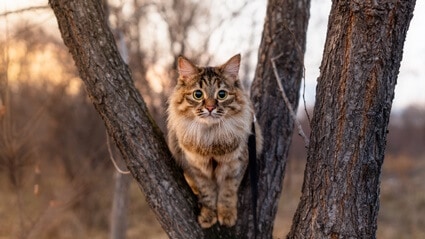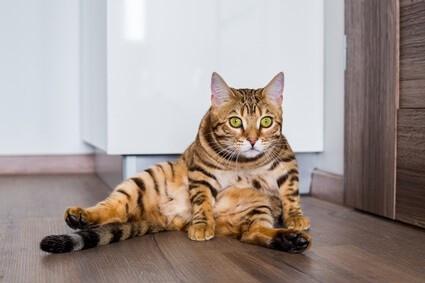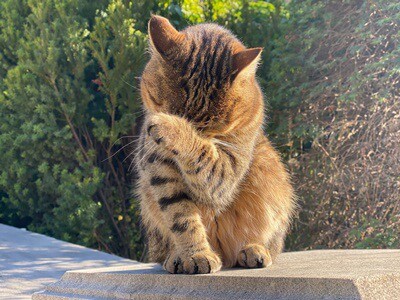When a cat falls, it may immediately look around, implying that it’s checking to see if anyone saw what happened. Owners interpret such behaviors as meaning that cats feel embarrassed, especially when you laugh at them.
Feeling embarrassed is a complex emotion that requires a sense of self that cats lack. However, a cat’s behavior can suggest that it feels shame. Cats also have the part of the brain that humans have that processes embarrassment, but it’s significantly smaller. Unfortunately, there’s no clear-cut answer to whether cats feel shame.
Despite that, many owners believe that their cats are embarrassed when they poop, puke, fart, or fall over. The problem is that these behaviors can have explanations that have nothing to do with feelings of shame.
Can Cats Get Embarrassed?
As mentioned, it’s unclear whether cats can get embarrassed.
According to the JFSM, cats have emotions, at least to an extent. Cats can seem happy, angry, frightened, and jealous, and it’s also possible to infer this from a cat’s behavior.
For example, you might interpret a cat’s facial expression as happiness or anger. A cat’s body language, such as its tail movements, can also tell you when it’s feeling annoyed or happy.
While it’s important not to anthropomorphize animals and think that they experience things the same way that humans do, it’s clear that cats do have basic emotions. This seems to be the case even if it can’t be conclusively proven.
However, embarrassment is a more complex emotion. While it seems that a cat’s behavior suggests embarrassment, there may be other explanations.
What Do Cats Look Like When They’re Feeling Embarrassed?
The reason why people think their cats are embarrassed is their body language, which changes regularly.
Cats half-close their eyes and sit without tension when they’re happy. However, cats don’t smile. Similarly, when cats are tense, they may swish their tail and hold their bottle-brush tail stiffly upright.
There are several things that cats do that lead people to think that cats are embarrassed, such as:
- Looking around after they do something embarrassing to see if anybody saw
- Immediately grooming themselves, as if to pretend that the embarrassing thing didn’t happen
- Hiding somewhere that nobody can see them
- Covering up their poop with litter or vomiting somewhere that nobody will see
These behaviors remind us of ourselves as we do similar things when embarrassed.
What Emotions Do Cats Feel?
According to PloS One, a human’s emotions can influence the emotions of their cats. Felines have the brain structure and social understanding required to feel emotions, so cats’ emotions are likely similar to those humans feel.
But certain emotions are more complex than others. For example, anger is a simple emotion that’s useful to any animal in an evolutionary sense. Cats almost certainly have simple emotions like anger while seeming happy and contented at other times. However, embarrassment is completely different.
To be embarrassed, you have to:
- Have a sense of self. You feel embarrassed because you look silly in front of others. If you didn’t have a sense of self, there would be nothing to feel embarrassed about.
- Understand what others think of you. You have to understand that others think different things about you. You also have to care about what those thoughts are.
It’s not clear that cats can think thoughts this complex, and this would imply that it’s more likely that cats can only feel primal emotions like fear, anger, and happiness.
Embarrassment And The Feline Brain
According to Live Science, this thumb-sized area is called the pregenual anterior cingulate cortex.
The scientists behind the study believe that the smaller this area of the brain, the less likely a person is to feel shame. Cats have the same brain structure because the brain’s layout and functions are virtually the same in all mammals.
How much this brain area contributes to embarrassment in cats has not been studied. This is partly because studies of emotions often rely on self-reporting, where the test subjects tell the scientists what they’re feeling, and cats clearly can’t self-report.
Because they share the same brain structure, cats can likely feel similar emotions to our own to an extent. But how much shame they feel, and whether a cat’s feeling of embarrassment feels like our own, isn’t clear.

Do Cats Get Embarrassed When They Poop?
When a cat poops, it will cover the poop with litter from its tray. If the cat goes to the toilet outside, it will use something else like soil or sand. An owner might interpret this to mean that the cat is embarrassed. However, there is a simple explanation for this behavior which is nothing to do with embarrassment.
In the wild, animals have to be on the lookout for predators constantly. They have to avoid being seen, smelled, or heard. This ensures the animal’s survival, so these behaviors are evolutionary.
One way in which a predator can track an animal is by smelling its urine or poop. The predator can smell how recently a cat went to the toilet, and from that, figure out how near the prey is. It can also learn what kind of prey it is.
As such, the basic explanation for a cat covering its poop is that it’s covering its trail. That doesn’t rule out any embarrassment; the cat may be driven to do so by a feeling of shame, but it’s not possible to tell.
Do Cats Get Embarrassed when They Fart?
Cats are unlikely to be embarrassed by flatulence. To understand why this is the case, you have to understand why people are embarrassed to break wind.
One key reason is public humiliation. Most people had an experience growing up where they farted in class when younger and were laughed at. Formative experiences like these can shape how you feel when you get older. Even if you don’t think about the specific instance, you can still experience shame.
If not, many parents, particularly of older generations, would tell their children off for farting. This can have the same effect. Cats don’t have these experiences, so they won’t feel embarrassed.
There’s also the fact that farts smell unpleasant, and people find it embarrassing when they smell bad. While cats like to keep clean, there’s no sense that they’re embarrassed when they’re dirty or their fur is messy. So, it’s unlikely that a cat would be embarrassed for a foul-smelling fart, either.
Do Cats Get Embarrassed when They Fall?
One of the times that people report that their cats feel embarrassed is when they fall or trip. A cat might fall off a table, for example, and then quickly look around. An owner might interpret this as the cat checking to see if anybody saw the embarrassing event that happened.
After all, cats are accomplished jumpers and presumably take great pride in their agility. So, when a cat falls, it’s like somebody who’s normally good at something makes a silly mistake. For a person, that would be embarrassing.
However, you must be careful not to anthropomorphize pets. They don’t experience things in the same way that humans do. Their emotions aren’t the same as ours, and they don’t think the same way. A cat’s instincts and thought patterns will remain largely the same as when they were wild.
You can explain a cat’s behavior in other ways:
- Cat looks around after it falls, it may be assessing the situation as falling can make a loud noise and attract a predator.
- Cat hisses at you after it falls, it may be reacting with shock. It may also think that you are somehow responsible for its fall as cats don’t really understand cause and effect.
Because scientists haven’t studied this phenomenon, it’s impossible to say what causes these behaviors.

Do Cats Get Embarrassed When They Puke?
Throwing up is a situation where it makes evolutionary sense for a cat to feel ashamed. If you have ever been around your cat when it vomits, you may have noticed that it looked up at you after it did so. It may have had a strange look on its face that humans associate with embarrassment.
While it’s impossible to say for sure how the cat feels, it would make sense for it to be embarrassed. Embarrassment makes an animal want to hide away, and if it has to do something, it should do so in secret.
If a cat vomits near another cat, this won’t be good for either cat. Parasites or infections could spread from one cat to the other. So, if the cat were to evolve to feel ashamed and vomit in secret, there’s a higher chance that the other cat will survive.
The most obvious application of this scenario is when a cat is near a potential mate. If it passes its sickness on, its potential mate might die. But if it does so in secret, it might not pass on any health problems. This isn’t proof that cats feel embarrassed when they vomit, but it is a rationale behind the idea.
Do Cats Get Embarrassed When Playing?
Sometimes, a cat may be playing in a room on its own. When you see your cat, it may not notice you at first. But when it does, it will immediately stop playing with its toys or rolling around on the floor.
Just like when it falls, your cat may start grooming itself. It’s like the cat is pretending that it wasn’t playing at all. It’s difficult to explain this behavior without thinking that it is related to embarrassment, but it’s likely stopped to check for predators in the vicinity.
Do Cats Get Embarrassed when You Laugh at Them?
Some owners report that their cats react with shame when laughed at. Imagine that the cat falls from a surface, and you laugh at it. It may look over when you make the noise and even hiss back at you.
Being laughed at or judged is a major part of being embarrassed. You may feel completely comfortable doing something around friends but embarrassed doing it around strangers because you believe that you’ll be judged negatively. So, you may think that cats feel the same way.
But again, there’s no reason to believe that this is the case for cats. The primary reason is that cats likely don’t understand what laughing is in the first place. Only a few animals have been shown to make noises of enjoyment like laughter, and in all cases, they don’t sound anything like human laughter.
The cat won’t understand what the vocalization of laughter even means. This explains why cats look at you when you laugh or even react with hissing. You are making a noise that the cat clearly doesn’t understand.

